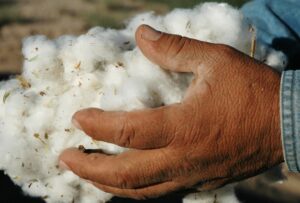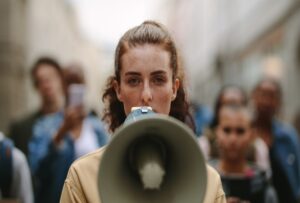London Fashion Week 2022 is here and whilst the world celebrates high end fashion, Georgina Russell, Fundraising and Communications Assistant, sheds light on the need to ensure that fashion isn’t being delivered at the cost of human rights.

This week marks London Fashion Week – one the of the biggest fashion events worldwide.
Here in London, streams of models will be showcasing next seasons ‘must-have’ trends, designs and pieces. The world will eagerly be watching as excitement will build at a new season of fashion, fun and creative freedom.
However, something unlikely to get as much attention is the forced labour behind the clothes we’re admiring, celebrating and buying.
Fashion shouldn’t come at the cost of a person’s freedom, or their emotional, financial and physical wellbeing. Things must change – and urgently. From workers in factories to cotton pickers out in the fields against their will, the fashion industry is implicated in the use of forced labour. Weak laws which do not compel businesses to take effective action, as well as voluntary corporate social responsibility initiatives have failed to protect people from forced labour. Brands are still profiting from, or linked to, forced labour and other human rights abuses in their value chains.
Forced labour: nothing new to fashion

We have been long campaigning about forced labour within the cotton industry, an industry which underpins fashion. Whilst we’ve seen positive changes in Uzbekistan, state-imposed forced labour in Turkmenistan and the Uyghur Region still continue, permeating the global cotton industry.
Just last October, researchers from Sheffield Hallam University released a ground-breaking report which tracked shipping routes, showing how UK companies are at a high risk of using cotton from the Uyghur Region, produced using forced labour. This was despite many having committed to terminating trade links with the Uyghur Region.
In Turkmenistan, the annual cotton harvest imposed by the government, has not long finished. Here, cotton is also produced with state-imposed forced labour. Workers in the public and private sector are sent to the cotton fields to pick their quota of cotton – or forced to pay someone to pick cotton for them – working in harsh conditions and under threat of losing their jobs if they refuse. Likewise, farmers who do not comply with the government’s harvest plan are forced to pay fines and risk losing their tenancies.
Here in the UK, the news has been awash with stories of exploitation. In 2020, workers in factories in Leicester – producing clothes for fast fashion giant Boohoo – were found to be being paid less than £4 per hour (well below minimum wage at the time). Employers were not providing workers with PPE in the midst the Covid-19 pandemic, whilst there were also allegations indicating forced labour at these factories, such as migrant workers who had their documents retained by their employers.
And it doesn’t just stop at clothes. Even the make-up the models wear could be complicit in forced labour. Many products we use daily – including make-up – contain mica, a substance mined by bonded labourers and children denied the right to an education in India.
These examples are sadly just a few of the mounting cases of forced labour within the fashion industry, and the reason why serious action need to be taken to stop forced labour across the board.
New laws: calling for urgent change

Globally, including in the UK, businesses are rarely held legally responsible for human rights abuses that occur in their value chains, including modern slavery. Voluntary corporate social responsibility initiatives have failed to protect people from modern slavery. Companies instead hide behind opaque supply chains, vague corporate sustainability statements and ‘ethical’ branding.
As consumers, it’s almost impossible to know if the clothes we’re wearing were made by individuals trapped in slavery. And that’s why we’re calling for legal reform.
We’re calling on the UK Government to introduce the Business, Human Rights and Environment Act, which would hold companies to account for the human rights abuses within their supply chains.
This law, if effectively implemented, would be a critical step towards ending forced labour for the millions of people who are currently being exploited globally. It would also level the playing field for businesses and give suppliers and consumers the reassurance that their money and purchases aren’t contributing to modern slavery.
We need the fashion industry to be held accountable for abuses in their supply chains. We need fashion to be slavery-free.
Join the campaign today by signing our petition calling on MPs to stop companies and public bodies washing their hands of abuses. Together, let’s make 2022 the year when fashion’s dark secret is finally out of the closet.
SIGN THE PETITION HERE